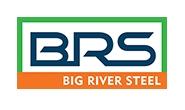Market Segment

July 1, 2017
Startup Flows Smoothly at Big River
Written by Tim Triplett
Once its new Ruhrstahl-Heraeus (RH) degasser is fully commissioned in the next 30-45 days, Big River Steel will have all its steelmaking equipment up and running. Except for “a few hiccups,” the startup of the new EAF mill in Osceola, Ark., has gone smoothly, said Mark Bula, chief commercial officer, “above plan, plan-plus.” Speaking at the recent AMM conference in New York, Big River CEO David Stickler said the new minimill is already running at 80-85 percent of rated capacity. By August, BRS hopes to be producing 130,000 to 133,000 tons a month, near full capacity for the 1.6-million-ton mill.
![]() It can now produce hot roll, hot rolled pickled and oiled, cold roll full hard, cold roll fully processed and galvanized. It can handle batch annealing or continuous annealing. The continuous anneal line will allow the mill to produce advanced high strength steels.
It can now produce hot roll, hot rolled pickled and oiled, cold roll full hard, cold roll fully processed and galvanized. It can handle batch annealing or continuous annealing. The continuous anneal line will allow the mill to produce advanced high strength steels.
Bula emphasized that the mill’s focus is not on producing the most steel, but producing the right steel. The product mix it offers will depend on market conditions. “We have always said we plan to take a balanced mixed approach, targeting the right markets, the right products, and the right customers, where we can add the most value.”
Bula said the mill will move quickly to secure orders for advanced high strength steels once the RH degasser is fully operational. The RH degasser will allow the mill to produce cleaner, more formable steels.
BRS intends to be a player in the oil country tubular goods space. It has different grades of material under trial at various API (American Petroleum Institute) pipe producers. Initially, it intends to offer basic grades, then move up the value chain to higher strength grades by later this summer or early fall, Bula said.
The mill’s initial foray into the electrical steel segment will be limited to cold rolled motor laminations, he added. “True electrical steels—silicon steels, grain oriented and non-grain oriented fully processed material—will require additional investment by our company. That has always been the plan.”
Big River’s long-term plan includes the addition of a second furnace and caster, but the mill’s early success has not changed the timeline, at least not yet. “You have to show investors you have been able to execute on the first caster” before seeking money for a second, Bula said.
He declined to comment on rumors that BRS is considering a second mill in Brownsville, Texas, to supply steel sheet to Mexico’s auto sector.
BRS calls itself the first Flex Mill, with the technology to offer the wide product mix and superior grades of an integrated mill, but with the nimbleness and economies of a minimill. Competitors and critics have accused BRS of adding unnecessary capacity to the market. “We have tried to be very responsible as we have entered the marketplace,” Bula said. “We have ramped up very quickly, but we obviously have been able to sell those tons. It’s not about overcapacity, it’s about having the right capacity.”







